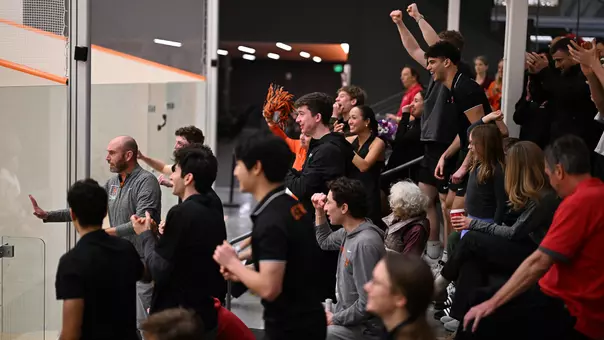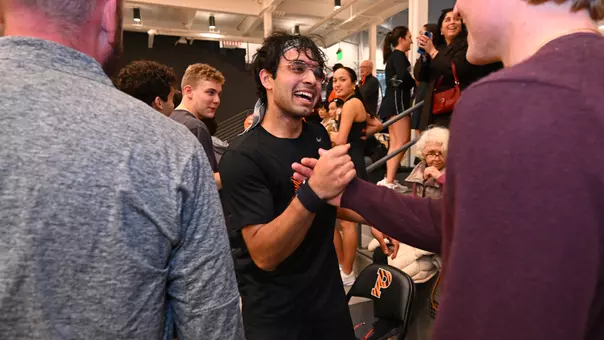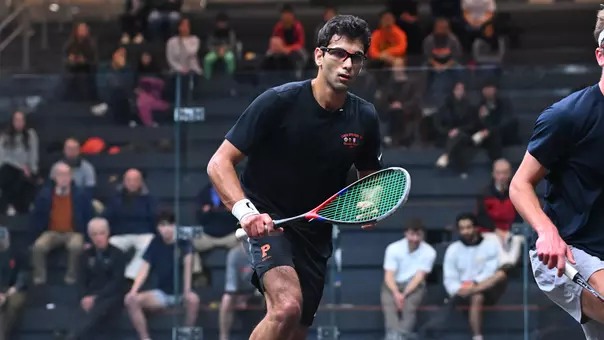Princeton University Athletics

Feature Story: Jeff Ingold And The Princeton Men's Squash "Ted Lasso" Connection
December 20, 2021 | Men's Squash
Every point in the sport of squash is an exercise in patience. Yes, you need the physical tools – speed, balance, hand-eye coordination, fitness, power to name a few – and yet you will get nowhere in the sport without mastering its demanding mental side.
Your instinct tells you to hit a winner every time. In reality, that’s a formula for disaster. Patience. Always. The ball needs to be returned to the front wall, and the player needs to be returned to the exact mid-point of the court, or as it’s known, the “T.” At the highest levels, this dance can go on for 10 shots, 15 shots, who knows how many shots on each point. Attack too eagerly, and you’ll find yourself hopelessly out of position, and all of the good shots you’ve hit to that moment will suddenly no longer matter.
And that doesn’t even take into account that, other than when it finally ends, each point is followed by another, and then another, and then another. Allow the frustration of one missed opportunity to spill over to the next, and you’ll miss that one too. Eventually, you’re engulfed by anger at how many points you’ve let get away, at which point it takes any remaining self-control not to smash your racquet against the nearest wall. Squash is most certainly a study in managing emotions.
Knowing all of that, it’s easy to see why Jeff Ingold was a standout squash player. He comes across as composed, unflappable, unflusterable, if such a word exists. Maybe it’s the squash player in him – he was, after all, the captain of the 1990 Princeton men’s team.
His demeanor doesn’t change when he speaks of his highest highs, the ones that have seen him twice reach the very top of his field, or the lowest lows, as when he was fired the first time he got there. He speaks slowly, in sentences that seem to be connected by semi-colons, with one well-considered, cogent thought that pauses to catch its breath and then heads directly into the next well-considered, cogent thought, his voice never rising or falling.
Is this really who he is?
“He is very, very even-keeled,” says Tom Barnds, his four-year roommate at Princeton and then again after graduation. “He’s my best friend. I can tell you that he is very even-keeled.”
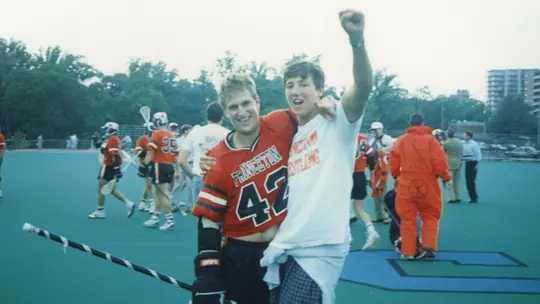
Barnds does not speak in semi-colons. He speaks in exclamation points, his passion on the subject obvious at all times. He says three words in the time it takes Ingold to say one. Barnds was very much not a squash player. He was a lacrosse player, like Ingold a Tiger captain in 1990.
If anyone knows Ingold and can talk about him, it’s Barnds. They grew up literally on the same street in Birmingham, Mich., and played Little League Baseball together. When they were eight years old, they turned a double play to get the final two outs of a game. Ingold may be hesitant to talk about himself – in fact, he hardly ever agrees to give interviews – but Barnds will talk about his friend all day long.
“He’s always composed, but with a quiet intensity,” Barnds says. “He may come across as laid back, but there’s a very strong competitive drive and nature there. There’s a quiet intensity to him, and it’s really served him well.
Brett Goldstein puts it a bit differently. Goldstein is Ingold’s co-worker. You might not recognize his name, but if you’re a fan of smart, sharp, charming television, then you almost surely would recognize his face. Goldstein plays Roy Kent, the aging English soccer superstar turned failed broadcaster turned assistant coach for the fictional club AFC Richmond, on the AppleTV show “Ted Lasso.”
Roy Kent is completely lovable and completely gruff, punctuating his sentences with one expletive after another, whether it’s in the lockerroom, as a soccer commentator on television or at his niece’s elementary school. Goldstein portrays Roy Kent, and he’s also a writer on the show. He also loves the exclamation point.
“He hates hugs,” Goldstein says of Ingold. “I love hugging him. He hates it.”
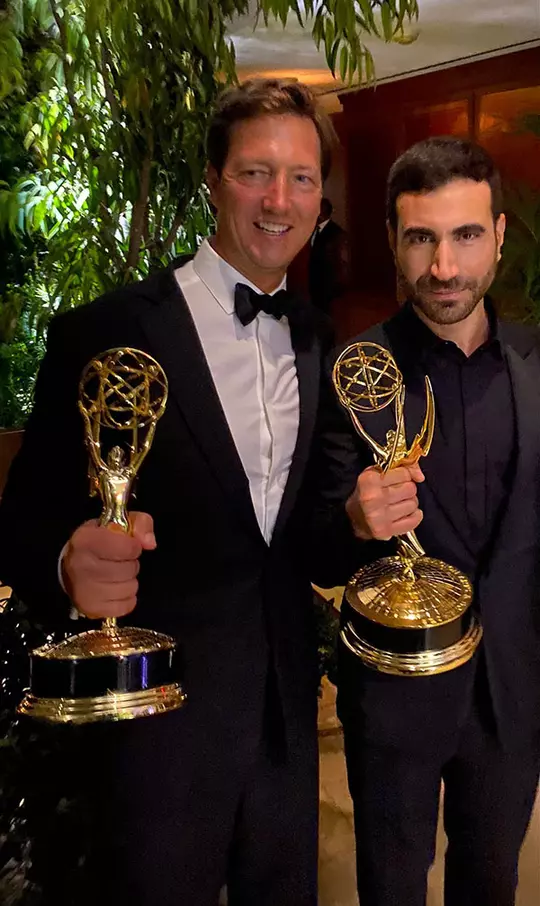
Ingold is the executive producer for the show, which has gone from two shorts on YouTube of a character created by Jason Sudeikis to an international television sensation. Ingold has played a central role in making that happen, or according to him, a supporting role in making that happen.
“Jason deserves 99.9 percent of the creative credit,” Ingold says. “This all came out of his brain. He’s executing it on a daily basis. This is his vision. We’re all just helping him execute it.”
Ingold is adamant that Sudeikis deserves all of the accolades, that he is a right-place, right-time facilitator. Sudeikis plays the title character, a former American college football coach who is hired to coach an English Premier League team despite no prior experience in soccer. Sudeikis, who won the 2020 Emmy for outstanding actor in a comedy season, is the on-camera and off-camera driving force, along with head writer Bill Lawrence, who found previous successes with “Scrubs” and “Spin City” and with whom Ingold partners. For his part, Ingold is the perfect complement, the liaison between the show and the studio, the connection between the creative end and the business end. Ingold earned an Emmy of his own when the show won Best Comedy, and Goldstein’s hilarious portrayal of Kent resulted in a Best Supporting Actor Emmy for him as well.
“Jeff is very humble,” Barnds says. “He has great humility. He is the greatest guy you’ll ever meet.”
But is he funny? The show he produces is. What about the executive producer?
“He has the driest sense of humor you’ve ever encountered,” Goldstein says. “He makes me laugh a lot. I love working with him.”
“He’s got a really dry sense of humor,” Barnds says. “It’s a sophisticated sense of humor. You can definitely see Jeff’s fingerprints on the shows he’s worked on.”
That list of shows includes some of the best comedies television has seen in the last 20 years or so. His resume includes “Will & Grace,” “The Office,” “Community,” “Scrubs,” “Just Shoot Me,” “Parks and Recreation” and “30 Rock,” all before he began working on “Ted Lasso,” the one that finally won him a long-overdue Emmy.
His friendship with Barnds detoured only once, when they went to different high schools. When they were seniors, they found themselves at the same party one night, where one was wearing a Princeton sweatshirt. It was there that they found out that they both had applied to Princeton, and it was there they agreed they would be roommates if they both attended the school.
“I don’t think either of us thought the other would get in,” Barnds says.
The person who had helped Ingold fall in love with Princeton was Bob Callahan, the longtime men’s squash coach who tragically passed away from brain cancer in 2015 at the young age of 59. Callahan also spoke in exclamation points, and his exclamation points were declarations of his never-failing positivity. Even as his disease began to get the best of him, he still described his radiation treatments as “wonderful!,” which was always a statement of how much he appreciated the doctors and nurses. That’s just how he was.
“Bob was a fantastic guy,” Ingold says. “I was 14 or 15 when I started going to junior camps at Princeton, and I immediately fell in love with the campus for obvious reasons. Bob was the biggest selling point though. He was such a great coach, a great mentor, a great friend. The chance to be a player under Bob was too great not to jump at.”
He would letter four times in squash, playing in the middle of the ladder his first three years, which included an Ivy League title his junior year, before a back injury kept him out his senior season. Despite that, he was voted a captain by his teammates for that season. He graduated with a degree in history and wrote his senior thesis on Jimmy Hoffa’s rise to power.
“It was a great experience,” Ingold says. “I loved my time at Princeton. I think the highlight was definitely being part of the team. The older guys on the team quickly welcomed us in and were super fun. They were awesome teammates who looked after us. And there are just so many fantastic memories. We didn’t have a big bus to travel. We had a van, and I have incredible memories of Bob when he was driving the van. It was always a highlight, watching Bob trying to drive through Northeastern blizzards. It was fun just being around that group.”
His roommate each year was Barnds. For two of their years, they also roomed with wrestler John Gluckow, who would be a first-team All-Ivy selection himself. It was there that Ingold first gave off a sense of what was to come for him.
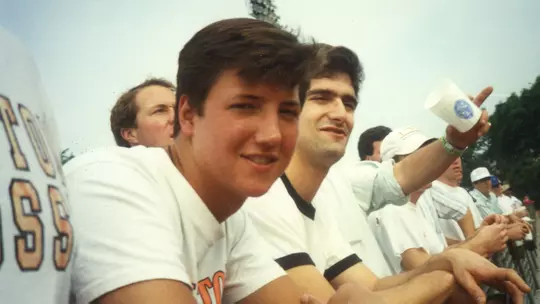
“We’d go out on Thursday nights,” Barnds says. “But before that, we’d watch Thursday night TV comedies. I started to think that he was going to do something in the entertainment industry. We’d be watching the shows casually. He’d watch it way more intently. He’d comment on things on the show and say ‘that doesn’t make sense’ or ‘that character wouldn’t do that’ or ‘that wasn’t consistent’ or ‘that worked.’ We were just laughing and not playing attention. He was picking up things.”
Ingold followed squash teammate Ted Price, who was thinking of joining the Navy, to San Diego after graduation, not completely certain what was next.
“I just wanted to go to California,” Ingold says. “I wanted to see what it was like. A lot of people come out here for the movie business. I wanted warm weather and the ocean. Ted never ended up in the Navy by the way. He got into video games and started a company that he ended up selling for a lot of money.”
Barnds, too, went to California, and he and Ingold roomed together in Manhattan Beach for a few years, before Barnds got his MBA at Stanford and settled in Northern California. Ingold was Barnds’ best man at his wedding (“You don’t want someone that handsome to be in the picture with you,” Barnds says laughing).
Ingold would earn an MBA of his own, at USC. While trying to figure out what came next, he took an internship at Warner Brothers. With his foot in the door, he started to learn what the television business was all about.
His first “real” job was as a research analyst at NBC. Within 15 years, he worked his way up to the network’s Head of Comedy, a huge position in the industry.
“I knew he’d be great at whatever he put his mind to,” Barnds says. “He started out answering phones and scheduling meetings and worked his way up. He’s low-key, but he was becoming much more well known in Hollywood. He had a small group of writers and actors that he’s worked closely with over time, and that group has gone on to be very successful. In an industry where things are often transactional, Jeff developed deeper relationships and earned a lot of trust. That served him well.”
Being a high-ranking television executive, though, can be like being a head coach of a professional team. When Comcast bought NBC in 2011, he was fired from his job. The way he tells the story speaks volumes about who he clearly is.
“Hey, we had six different network president bosses during my time at NBC,” he says. “I survived longer than most. I knew my time was up. It’s a very tumultuous business. You reach a time when your number is up.”
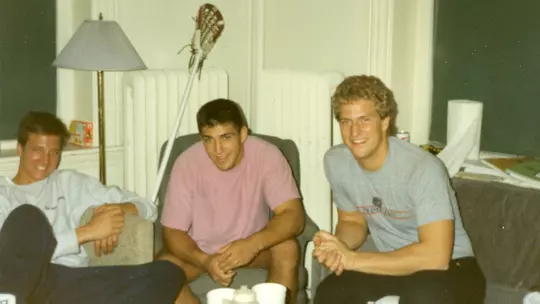
Because of the relationships he’d built, he wasn’t unemployed for long. He would join up with a man named Bill Lawrence, who started his own production company. Ingold would become a producer, and they would work extensively with Warner Brothers.
As for “Ted Lasso,” it’s a lesson on how shows end up on television. It started with Sudeikis and his “Ted Lasso” shorts. Then Ingold and Lawrence met with Sudeikis about a different project.
“Jason said he didn’t want to do our script,” Ingold says. “Then he said he had this other character named Ted Lasso that he wanted to make into a television show. We wanted to work with Jason, and we thought the shorts were really funny. We said ‘yeah,’ let’s do it.’”
The next step was to create a pitch for the show. While Ingold and Lawrence have a studio deal with Warner Brothers, they still needed to shop it around to find a network.
“Netflix. Amazon. Hulu – everyone passed,” Ingold says. “There was no Peacock or HBO Max yet, which made it tougher. AppleTV was the only one who said yes, so we made the deal with them.”
The first season was shot at the West London Studios, just before the pandemic. It was released on Aug. 14, 2020, right in the heart of the pandemic.
“Could you imagine a better time for that show?,” Barnds says. “It came out when we all needed it. It was the perfect show, and the perfect timing. We were all looking for something to do and to watch. To get someone relentlessly positive with a positive message was just what we needed.”
Sudeikis has created a character that drips with positivity, and he’s also surrounded by a great supporting cast. How deep is the AFC Richmond roster? Goldstein and Hannah Waddingham, a West End singer/actress who plays the team owner, won Emmy Awards in the Best Supporting categories, but four other cast members were also nominated (three men and one woman, Juno Temple, who plays the team’s head of marketing and Kent’s girlfriend). The soccer scenes are great, with players who are easy to root for, and the show blends these lovable characters with a great sense of the passions that surround professional football, as it’s called, in England. The end result is a product that works on every level.
“Season 1 was a revelation,” Barnds says. “It was so incredibly well done. It’s ostensibly a show about sports, but I don’t know that it really is about sports. It’s about relationships. I just think it’s brilliant, the characters, the writing, the acting.”
Did Ingold knew he had something special before it caught on? Had he developed the ability to sense that?
“Jason always knew,” Ingold says. “He had more confidence. He would say he isn’t surprised by the success. For me, it took longer to get our heads around it, how it would perform. For one thing, Apple was a new streaming service. Also, it’s not a typical half-hour comedy. There are a lot of pathos and emotion and drama. The episodes are longer. Jason likes the slower pace. There are a lot of things about the show that are atypical to a regular 30-minute show. It’s also very difficult to take a sketch character and a sketch premise and expand that into a full TV show. The other part is that soccer isn’t America’s pastime. We weren’t sure how U.S. audiences would react to a sports show set in the world of British soccer. A lot of things made us a bit reticent and maybe not as confident, and that’s not even mentioning that as we got closer to the premier date, we weren’t sure how the pandemic would impact things. There were enough things about this show that made us all a little nervous. We were hopeful though, because we knew Jason was incredible, and the cast came together into something really special.”
Despite all of the obstacles, the show was an immediate hit, with fans and critics. Here is part of a review from “Variety,” which pretty much captures exactly what makes the show great:
“Above all odds, ‘Ted Lasso’ chipped away at my skepticism until there was none left—just like the character himself does to everyone he meets. At a time when just about everything feels catastrophic, there's something undeniably satisfying about spending some time with good people who are just trying to be the best they can, on and off the field.”
For Ingold’s part, he started to sense they might be onto something when he began to receive a different kind of feedback.
“I’ve worked on a lot of shows,” he says. “I’d never received this amount of positive incoming correspondence. ‘The Office.’ ’30 Rock.’ People would tell me how funny it was. I never had people saying how emotionally impacted they were by a show. We had people thanking us for the show. That’s when I knew we were striking a chord. This year on Halloween, when ‘Ted Lasso’ became a costume, that’s when it was clear that it had become such a part of the culture. That meant we had turned a corner.”
If he had been concerned about releasing it during Covid, he shouldn’t have been. As Barnds said, it was the perfect time.
“The timing was such that it became an important TV experience for so many families,” Ingold says. “We’ve worked on a lot of shows. We had never heard people talk about how their family looks forward to watching it together. We certainly didn’t intend for it to be a family show. You can tell that by the language. But it’s resonated.”
Filming the second season was challenging because of the pandemic, but it was even better received than the first. Season 3 will begin filming in England in February. Sudeikis originally imagined a three-year run, but the show’s success may make that timeline be revisited. Ingold doesn’t spend the entire time of the filming in England, but he does travel back and forth to check in on how it’s going. When he’s in the U.S., he lives in Southern California with his wife Elizabeth, a graduate of the University of Virginia, and their children, daughter Lucy, who is a freshman at the University of Chicago, and 16-year-old son Teddy (clearly not named for the title character of the show that won Ingold the Emmy).
Through all the success, he’s stayed true to who he is, which means he’s the same down-to-earth, genuine person he’s always been.
“He gets all sides of the business and is super smart on scripts,” Goldstein says. “He’s also a very intelligent and decent man. He’s secretly kind.”
Ingold bristles at only one thing, and that’s the idea that he deserves credit for the show, instead giving it all to Sudeikis and Lawrence. He’s also taken winning his Emmy in stride, calling it a “great professional moment.”
It’s more than that, though. It’s a statement on the work he does, the relationships he’s built and the way he’s risen once again to the top of his field.
“This is a competitive business,” he says. “It’s extremely competitive. It’s a joy to compete as part of it day to day here. There are definitely elements of being a college athlete that spill into your daily life as a producer, the winning the losing, the drive to win.”
In “Ted Lasso” he’s had a win, his biggest win. He’s not taking the credit for that, of course, but hey, his Emmy Award suggests he did something big to contribute to this victory.
– by Jerry Price
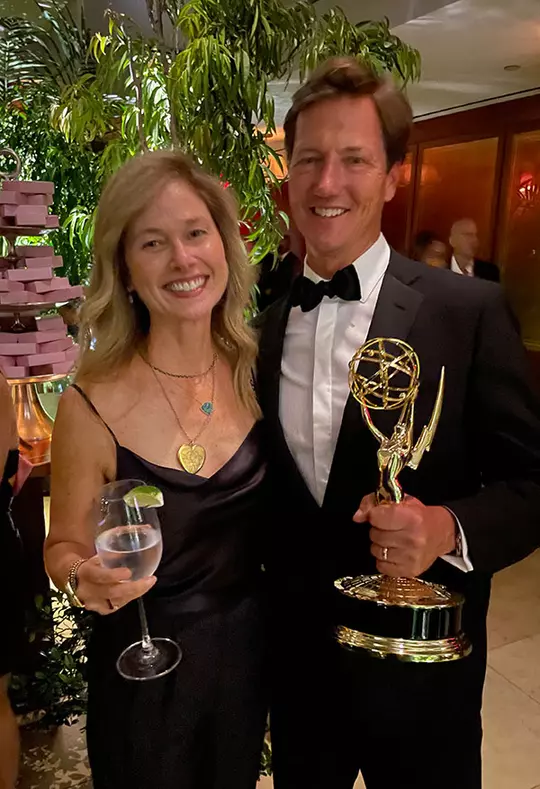




.png&width=24&type=webp)




